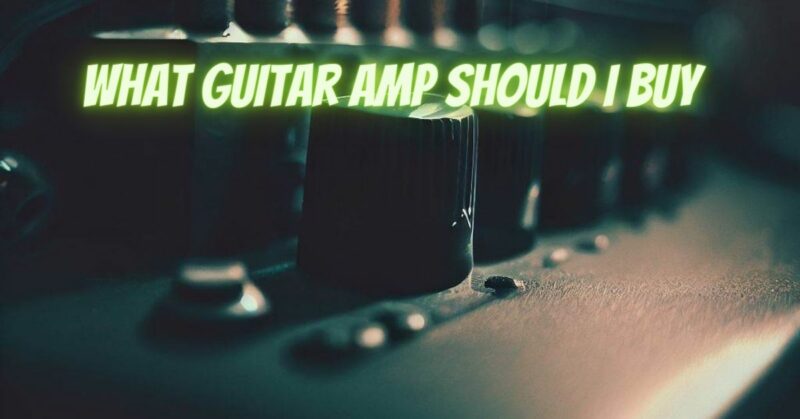Selecting the right guitar amplifier is a crucial decision that greatly impacts your sound and playing experience. With a wide range of options available, finding the perfect match can be both exciting and challenging. In this article, we will guide you through the key factors to consider when choosing a guitar amp, helping you make an informed decision that aligns with your musical style, preferences, and budget.
- Determine Your Needs and Musical Style:
Before diving into the specific features and models, it’s important to identify your needs and the musical style you primarily play. Consider the following factors:
- Genre: Different musical genres often require specific tonal characteristics. Determine if you primarily play rock, blues, metal, jazz, country, or other styles, as this will influence the type of amp that best suits your needs.
- Playing Environment: Consider where you will primarily use the amp. Will you be performing on stage, rehearsing in a studio, or practicing at home? The size of the venue and volume requirements will play a role in choosing an appropriate amplifier.
- Portability: If you plan to move your amp frequently for gigs or rehearsals, you may prioritize a lightweight and portable option.
- Amplifier Types:
There are various types of guitar amplifiers, each with its own sonic characteristics. Here are some common types:
- Tube Amps: Known for their warm and dynamic tone, tube amps are favored by many guitarists for their rich harmonics and natural compression. They often require more maintenance and can be louder, but they offer a classic and authentic sound.
- Solid-State Amps: Solid-state amps use transistors instead of tubes, providing a reliable and consistent tone. They are often more affordable, require less maintenance, and offer a wide range of features. Solid-state amps are popular for their clean and crisp sound.
- Modeling Amps: Modeling amps use digital technology to replicate the sound of various amp models, allowing you to emulate different tones and effects. They are versatile and often include built-in effects, making them a popular choice for players seeking a wide range of sounds in a single package.
- Hybrid Amps: Hybrid amps combine tube and solid-state technologies, offering the best of both worlds. They provide the warmth and character of tube amps while utilizing solid-state circuitry for added reliability and versatility.
- Power and Wattage:
Consider the power and wattage requirements based on your intended use. Higher wattage amps are typically louder and suitable for live performances or larger venues. Lower wattage amps can be great for practice or smaller gigs where volume is not a primary concern.
- Features and Controls:
Pay attention to the available features and controls that suit your playing style and preferences. Some common features include:
- Gain and Overdrive: Determine whether you prefer a clean sound, classic overdrive, or high-gain distortion. Look for an amp with controls that allow you to shape your desired level of crunch.
- EQ Controls: Consider the presence of tone controls such as bass, mid, and treble knobs. This allows you to shape the overall tonal balance according to your preferences.
- Built-in Effects: Decide if you prefer an amp with built-in effects such as reverb, delay, modulation, or other effects. This can save you the need for additional pedals.
- Channels: If you require versatility in tone, consider amps with multiple channels, allowing you to switch between clean and distorted sounds easily.
- Budget Considerations:
Set a budget range that aligns with your financial resources. It’s important to strike a balance between the features, quality, and affordability of the amp. Research different brands and models within your budget to find the best value for your investment.
- Try Before You Buy:
Whenever possible, try out the amp before making a purchase. Visit local music stores or attend guitar expos to test different models and experience their sound firsthand. This hands-on approach can provide valuable insights and help you make an informed decision.
Choosing the right guitar amp involves considering your needs, musical style, desired features, power requirements, and budget. Take the time to research and test various models to find an amp that complements your playing style, delivers the desired tone, and meets your specific requirements. Remember, the perfect amp is the one that inspires you to play and brings out the best in your sound. Happy amp hunting!


